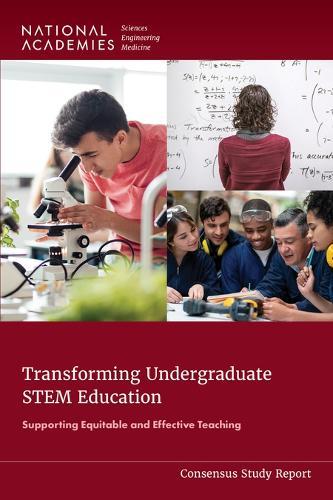Overview
Society will not fully benefit from development and use of future discoveries and innovations if we do not provide full access and opportunity to engage in effective STEM education - and we may lack the information, tools, and resources needed to address future challenges facing our planet. Commonly used methods of teaching undergraduate STEM education benefit only a relatively small percentage of learners, leading many to choose not to enroll in STEM courses or pursue STEM careers. This trend severely limits participation in the STEM careers that play a critical role in our nation's prosperity. High quality instruction, learning, and engagement in STEM should be a key priority for colleges and universities across the United States. Transforming Undergraduate STEM Education: Supporting Equitable and Effective Teaching calls on leaders of institutions and academic units, instructors, and other stakeholders to leverage their important roles to improve the landscape of undergraduate STEM education so that all students can thrive. As one step toward addressing inequities and transforming undergraduate STEM education, this report presents a set of Principles for Equitable and Effective Teaching. These Principles provide guidance for instruction that draw on decades of research on teaching, learning and equity. Transforming Undergraduate STEM Education provides guidance for improving teaching and related changes to the institutional context that are needed to support instructors and enable student-centered undergraduate STEM education. Table of Contents Front Matter Summary 1 Introduction 2 Institutional Context of Post-Secondary STEM Education 3 Understanding Teaching,Learning, and Equity 4 Principles for Equitable and Effective Teaching of Undergraduate STEM Education 5 Using the Principles to Improve Learning Experiences 6 Role of Academic Units in Achieving Equitable and Effective Teaching 7 Student Pathways Through Undergraduate STEM Curricula 8 Supporting Equitable and Effective Teaching Through Ongoing Professional Learning and Development 9 Role of the Institution in Creating Equitable and Effective Learning Environments 10 Recommendations for Current Action and Future Research References Appendix A: Public Comments on Draft Report and Committee Response Appendix B: Biographies of Committee Members and Staff
Full Product Details
Author: National Academies of Sciences, Engineering, and Medicine ,
Division of Behavioral and Social Sciences and Education ,
Board on Science Education ,
Committee on Equitable and Effective Teaching in Undergraduate STEM Education: A Framework for Institutions, Educators, and Disciplines
Publisher: National Academies Press
Imprint: National Academies Press
ISBN: 9780309729987
ISBN 10: 030972998
Pages: 388
Publication Date: 22 August 2025
Audience:
Professional and scholarly
,
Professional & Vocational
Format: Paperback
Publisher's Status: Active
Availability: In Print

This item will be ordered in for you from one of our suppliers. Upon receipt, we will promptly dispatch it out to you. For in store availability, please contact us.



